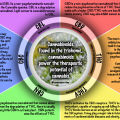For many people who have been through an alcohol rehab program – whether it was residential or out-patient – the scariest time of all is the day you leave the program.

That’s because alcohol rehab programs provide a lot of structure and support. For the 28 days, 90 days, or however long it has been since you’ve been in the program, there’s always been somebody there for you: Somebody to talk you through your urges to drink, someone to help smoothen the transition to sober living, and somebody to give you the reassurances and encouragement you need to keep going.
The day you leave the program, all that support is no longer there. And that can be terrifying to the recovering alcohol addict.
Here then are five steps you can take to keep your recovery going even after your residential or outpatient treatment program has reached its end:
‘One Day at a Time’
“One day at a time” is probably a saying that you have heard a lot during your recovery process. That’s because it really works.
Nobody can control the way they are going to behave or the things they are going to do two years from now, or even two days from now. All you can control is what you do today, right now. That’s why you need to take your sobriety one day at a time.
You can manage today. You’ve already proven it by successfully completing an alcohol treatment program. And today’s all you need to worry about for right now.
Find New Support
If alcohol recovery has taught you anything, it’s that you can’t always handle your problem on your own. Sometimes you are going to have to rely on other people. And that means trust, which is something often in short supply for the recovering addict.
Check to see if your recovery program offers ongoing support, including group meetings and one-on-one counseling. If not, they are certain to be able to refer you to a program in your area, whether it’s through Alcoholics Anonymous or another group.
The important thing is that the recovering addict needs to understand that they don’t have to go through their struggle on their own. There are plenty of other people who are going through the same thing you are and who need you as much as you need them.
Find a meeting, keep going back, and you can stay on your path to recovery.
Learn to Appreciate Life Again
During your recovery program, it was important to focus inward. That’s why access to family and friends is limited during the treatment time and recovering addicts are discouraged from getting into new relationships.
But once you have made it through the initial detoxification, counseling and support, and initial steps of recovery, most people find that they have a new appreciation for life. They realize that there are people who still love them, despite the drama that they have put them through. They recognize that they have unique talents that they can use to contribute to a useful life as part of their society.
Take small steps, but as you lengthen your sobriety you can start to reclaim the best parts of your former life and regain an appreciation of your family, friends, career, and everything else that makes you who you are.
Give Back
Recovery is a group process, not a solitary one. If you relied on the help of other people to make it through the most difficult parts of your rehab, then you owe it to other people and to yourself to give back once you are better.
Openly talk about your addiction and recovery at group meetings. Once you are strong enough, ask about volunteering to help other people by being a sponsor or advisor. Most recovering addicts find that the more they work to help other people heal, the less likely they are to return to their former drinking life.
Find New Focus
When any alcohol addict is in the throes of their addiction, the primary focus of their life is getting their next drink. But once they have been through the recovery process, people often find that their life lacks focus or an anchor.
Find one.
Continuing through life without something that is important to you is asking for trouble. You are more likely to return to drinking. Instead, choose something to prioritize in your life. It could be your work, mending the relationships you destroyed when you were drinking, helping other people recover, or anything else that is positive and restorative.
“Fake it until you make it” is another saying often heard during the recovery process. The act of making something important in your life can in itself give your life meaning. So keep trying.
Author Bio – This guest article has been written by John Sanders in support of The Cabin Chiang Mai, a top drug and alcohol rehab in Thailand.




























No Comments
Leave a comment Cancel